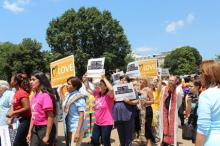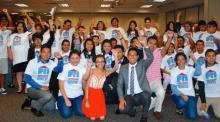Immigration








Midnight. 80 degrees. Palm trees, illuminated by the airport lights, lining the street. My dream was now a reality. Germany to Miami. I did it. I moved to America!
When I was 12, my family vacationed in upstate New York. From then on, I knew I wanted to live in America. When other children dreamed of becoming policemen, rock singers, and cowboys, my perpetual childhood dream was to become an American. I devoured books by German author Karl May, about an Apache warrior named Winnetou. His pride and honor started my fascination with this country.
I was 16 when I finished school in Germany, 17 when I finished school as an exchange student, and was 20 when I moved to Miami. I fell madly in love and we moved to Los Angeles. After some time, we moved to Detroit and got married. Then we broke up.
The breakup forced a brief pause as I unwillingly moved back to Germany to reset my visa. Before I left Detroit, I had set up an interview with another freight forwarder in Hamburg, under the condition that they would send me back to the U.S. I never, ever gave up on America — it was never, ever a consideration. Within ten days of arriving in Hamburg, I was at my new job at the German Freight Forwarder. Ten months later, I was back to my America — assigned to Houston.
When they moved me to Atlanta, I remarried. He was a contractor, and I quit my freight job so we could renovate houses together. Unfortunately, the relationship didn't work out. I thought I didn't need to worry about the visa situation because I was married to a U.S. citizen. Had our relationship worked out, I would have been on track for a temporary green card. I was single again, so I was in violation of my H1B visa — and of the five companies in Atlanta that I could have worked at, none of them had job openings.
I found a glimmer of hope — maybe I could switch to an entrepreneur visa. I quickly found an attorney to take my case, but later found out that he never filed anything.




In the face of an imploding immigration system, an exploding political debate and a deadlock on reform in Washington, it was religious leaders who rallied to form a humanitarian response to the surge of unaccompanied children crossing the border to the United States this summer.
The number of migrants crossing the border began its steady rise in 2011, but it escaped the Obama administration’s notice until spring, when the rise became a wave.
By September, 66,127 unaccompanied children and 66,142 Salvadoran, Guatemalan and Honduran families had crossed into the Southwest, mostly into the Rio Grande Valley. The flood contributed to a backlog in U.S. immigration courts of nearly 400,000 cases.
Nowhere was the religious leadership more apparent than in McAllen, Texas, where churches and local government forged an effective and compassionate response to the crisis.



America was a free country. There, freedom is everything. Growing up, that was the picture I had. America was the country where you’re free to do whatever you want.
It all changed when I turned 16. I woke up excited, ready to go to the DMV and get my driver’s license like all my friends were doing -- and then my parents told me that I was here illegally. I was undocumented. Reality sunk in. America was not a free country for me.

Last week would have been the 71st birthday of my mother who was tragically killed abroad 15 years ago. Because of my undocumented status, I still have not been able to visit her grave site. This experience is all too common in the undocumented community. This is one of the many reasons why, despite the fact that I am an American by default, I struggle with my connection with this country and with the very concept of citizenship.
My mother brought me here legally when I was 9 in 1985 after fleeing our home country of Senegal following a painful estate dispute once my biological father passed away. She found work as a diplomat at the United Nations, and I came here as her dependent. I then attended high school at Georgetown Preparatory School in Washington, D.C., and thus switched to a student visa. I continued my education in Philadelphia at the University of Pennsylvania for two years but had to leave because I couldn’t afford the tuition. My mother was in Zimbabwe then and I couldn’t afford going to join her. Unfortunately, neither my diplomatic visa nor my student visa statuses count towards getting a Green card. When I left school, my status lapsed, and I became undocumented. Three years later, my mother was killed — a victim of domestic violence. With no “home country” to go back to and no way to adjust my status, I had to adjust myself to a life in the shadows.

"Whoever welcomes one such child in my name welcomes me, and whoever welcomes me welcomes not me but the one who sent me.” —Mark 9:37, NRSV
I was raised in a family with strong beliefs in our faith. It is because of my faith that I continue to strive for a better future and do good to others. This is why I’m so passionate for my advocacy in education, regardless of gender, race, and immigration status.
When I lived in Mexico, I thought about America every day. To me, America was a country of freedom, a country where every dream could come true. My grandparents waited 12 years to get their visas. The wait was agonizing; every year we faced poverty and struggle in Zacatecas. With every year, my dreams of a better life in America got farther and farther away. The feeling of hopelessness was overwhelming and pushed me to attempt suicide.
In that moment, I turned to faith. My family came to my aid and helped me through. Knowing how desperate for opportunity I had become, my parents reached out to my aunt in the United States. Together, they saved enough money to pay for my visa application. I finally had a chance at a life outside of our small family farm.
It was the summer of 2009 when I finally arrived in America. I was 16.


